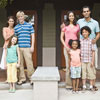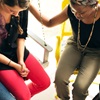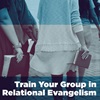Note: This article was excerpted from Missional Spirituality.
John 1: 14 in The Message says, "The word became flesh and blood, and moved into the neighborhood." Though the English word neighborhood does not match the Greek of John 1:14, Peterson offers a fresh application in his Bible paraphrase. In his theological reading, he extends the meaning of the Incarnation: Jesus came to a particular place, people, and culture. He was not an abstract man but a real, down-to-earth man who mingled with people in their natural contexts. He spoke Aramaic, ate meals with people, attended weddings, and worked as a carpenter. The literal translation of this verse is "he pitched his tent among us." Any desert dwellers among John's readers would understand the metaphor. Jesus camped with his people!
In a largely impersonal, isolated, and fast-moving culture, many find it difficult to relate to people in their neighborhood. Sometimes we are like Charlie Brown, who bemoaned, "I love humankind; it's people I can't stand." We exist in multiple communities and are rarely rooted where we live. How can you be a neighbor when everyone on your street is on the move? Simon Carey Holt writes,
God is revealed and encountered in place …. The radical liberation of our encounter with God is in its impact upon every aspect of life, from our daily work to the food we eat, from the places we choose to inhabit to the relationships that color our lives. God is a God of place. Our call to mission is a call to discern, embody, and proclaim the presence of God where we are. It's a call to neighborhood.
The Gospel of John begins with a theological reflection on the Incarnation: Jesus was human, visible, physical, and local. People saw and heard him. Yet, so often people become invisible to us: our workmates aren't neighbors; panhandlers aren't neighbors; and our actual neighbors are often anonymous to us.
But what if we read neighbor back into neighborhoods? What if we developed a theology of place? Eugene Peterson wrote, "Everything that the Creator God does in forming us humans is done in place .… All living is local: this land, this neighborhood, these trees and streets and houses, this work, these people."
Circle of Influence
Our fast pace and constant motion push us to withdraw from the people around us. And we attempt to live on mission anywhere but in the neighborhoods where we reside. Our call to mission comes to us in a particular place—with Bill and Linda right next door. We have the greatest potential for impact among those with whom we can relate casually, because we have a natural reason for interaction: we live in the same place. The Incarnation shows that we should begin where we are.
In addition, when we think of our neighborhoods, we must also think of our networks, places where we do life together in natural relationships: at work, at the kids' soccer and baseball games, in the schools, at pancake breakfasts, in community events, at Starbucks. The kingdom of God is a people and a place of community—with local opportunities to belong and to meet others.
To love our neighbor as ourselves and to be a neighbor to others means we will not just pass by that hurting person we see along our pathway and in our network. We must be ready to offer mercy with a good cup of coffee, a room to stay in, a free meal, payment for a medication, or next month's rent.
The challenges to missional living in suburbia are legion. Simon Carey Holt reminds us that suburbia has a utopian vision of life: "A community of like-minded citizens escaping one place to reside together in tranquility and peace in another." He points to the billboards along the highway, which offer the dream. The words community, security, and home are plastered over images of children riding their bikes, fathers rolling in the grass, airbrushed sunsets, and candlelit dinners. We all long for community, but the community that marketing technicians offer is no "place." It's an empty abstraction.
Visible Salvation
And yet, Jesus became a man and moved into the neighborhood. How do we make a difference? How do we as the physical church body of Jesus become visible to people? How do we become "placed" and invite people to come home? William Cavanaugh writes,
People are usually converted to a new way of living by getting to know people who live that way and thus being able to see themselves living that way too. This is the way God's revolution works. The church is meant to be that community of people who make salvation visible for the rest of the world. Salvation is not a property of isolated individuals, but is only made visible in mutual love.
A missional spirituality requires the practice of embodied presence through proximity. Jesus was not merely an ambassador from God. He was God in human body. He was present and close, not detached and aloof. Jesus became one of us and lived among us.
Consider Joan Osborne's song, "What if God Was One of Us?" When we enter our neighborhoods and networks, we enter pubs, restaurants, supermarkets, dentist offices, and schools where broken and needy people live, and we become Jesus for them. Lots of people feel like slobs and strangers on a bus trying to get home. When we engage in mission, we connect with people where they are and don't wait for them to come to us. Jesus still lives in our neighborhoods and relates to people in vast networks of relationships.
—Roger Helland and Leonard Hjalmarson. This article is excerpted from Missional Spirituality; used with permission of InterVarsity Press.










